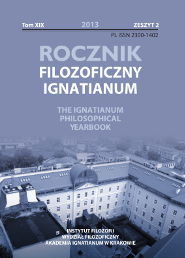On Remembering, or Concerning the Limits of Laws of Association
Abstract
Basing itself on Edith oStein's research into the philosophy of psychology and the humanities, this article focuses particularly on discussions of the theory of association. Stein's approach, rooted in a Husserlian phenomenological perspective, seems to represent a significant contribution to the establishing of an intellectual framework for the exploration of the philosophy of consciousness, and also seems helpful for inquiries into the issue of practical know-how pertaining to remembering things, as well as the use of schemata in intellectual activity generally.References
Arystoteles (1992), "Krótkie rozprawy psychologiczno-biologiczne. O pamięci i przypominaniu sobie", In Dzieła wszystkie. Warszawa Vol. 3 Wydawnictwo Naukowe PWN.
Augustyn, św. (2000), "Wyznania" Kraków Społeczny Instytut Wydawniczy Znak.
Hume D (1963), "Traktat o naturze ludzkiej" Warszawa Vol. 2 Wydawnictwo Naukowe PWN.
Hume D (1947), "Badania dotyczące rozumu ludzkiego" Kraków Polska Akademia Umiejętności.
Stein E (2010 [pierwsze wydanie w: "Jahrbuch für Philosophie und phänomenologische Forschung" 5 (1922), s. 1--116]), "Beiträge zur philosophischen Begründung der Psychologie und der Geisteswissenschaften" Freiburg Verlag Herder.
Łukasiewicz J (1961), "Analiza i konstrukcja pojęcia przyczyny", In Z zagadnień logiki i filozofii. Pisma wybrane. Warszawa , pp. 9-62. Państwowe Wydawnictwo Naukowe.
The Yearbook only accepts materials for publication that are free of all conflicts of interest, and that in no way involve conflicts over authorship, copyright, etc. The Editors will take action against any cases of plagiarizing, ghostwriting1, guest/honorary authorship2, etc. Where co-authored work is concerned, the Author listed first is expected to take responsibility for the submission, and is required to make clear the contributions of all of the Co-Authors involved. In the event of the publication owing its existence to funding dedicated to this purpose, this fact should be made clear: e.g. in any note of thanks/acknowledgement, or in a footnote, etc. Explicit notification should be given of any form of reprinting, with the appropriate evidence of permission to publish being furnished as required. Any impropriety on the part of Authors/Reviewers risks exposing them to appropriate responses from the relevant institutions.
______
1 This term refers to instances of a person who has made an essential contribution being omitted from the list of authors, or from notes conveying gratitude and/or acknowledgement.
2 This occurs when a person who has made either an insignificant contribution or no contribution at all nevertheless appears on the list of authors.





